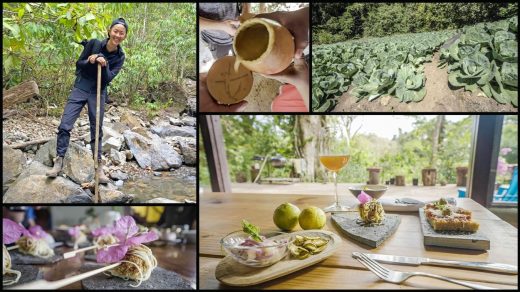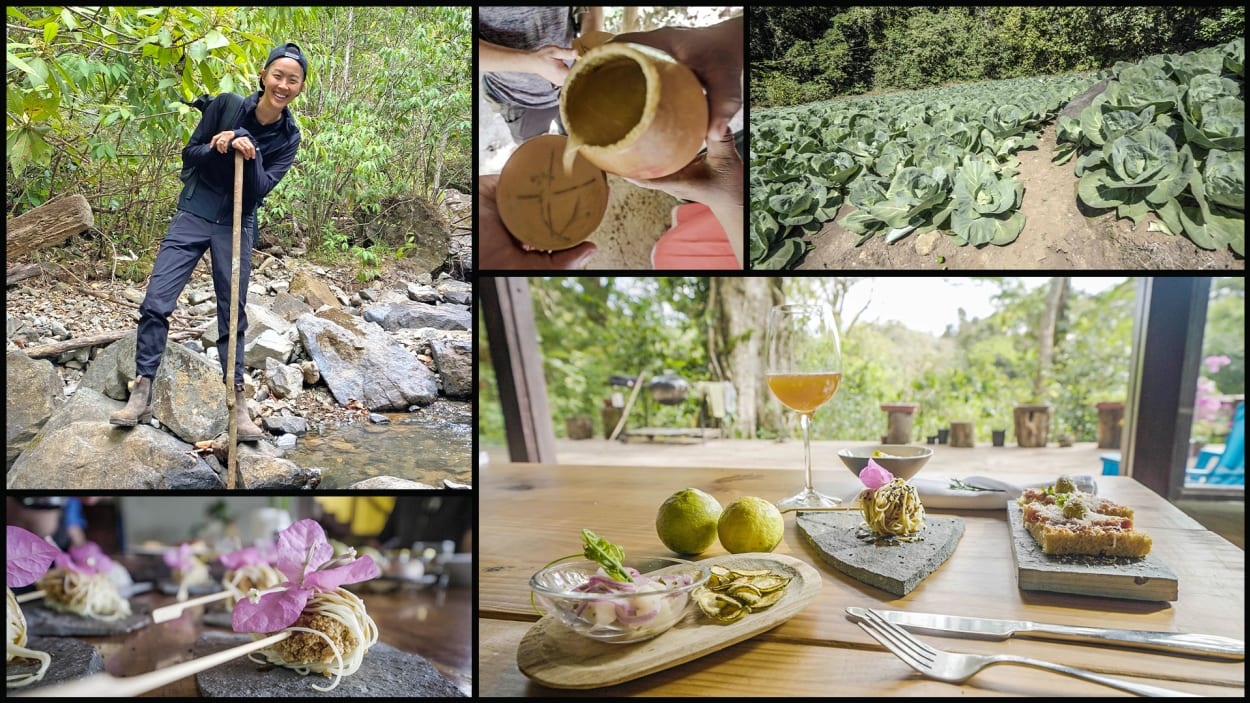Chef Kristen Kish steps out of her comfort zone with her new show
Ever since Kristen Kish won Top Chef 10 years ago, she’s been a regular presence in the world of culinary television. She’s hosted shows including Iron Chef and Fast Foodies, appeared as a guest on Seth MacFarlane’s variety show, and of course she’s returned to Top Chef as a judge. Outside the small screen, she also opened the French- and Italian-inspired Arlo Grey in downtown Austin in 2018.
But even those who have grown used to Kish’s media presence will find a new dimension to the chef on her latest vehicle, Restaurants at the End of the World. The show finds Kish exploring the people and culture behind a handful of remote (and often very beautiful) restaurants: In one episode, she’s helping pick watercress for the owner of Hacienda Mamecillo, a “trek-to-table” restaurant in Panama; in another, she’s helping to serve reindeer tongue pastrami at Isfjord Radio, a so-called adventure hotel in Norway.
Fast Company spoke with Kish about the origins of the show, sexism in the industry, and what it takes to lead a kitchen. The conversation has been edited for length and clarity.
Fast Company: I’ve just finished watching the first few episodes of your show, and it stands out to me that it’s more centered on the people making the food than the cuisine itself. Was that an intentional choice?
Kristen Kish: I’m glad that comes across because that’s how I went into it. It started with this idea of family meals around the country way back in 2019—this was before Nat Geo got involved—and it was always about [that]. In restaurants we have a family meal. My life is very much family: chosen family, given family, all the different forms of what family means these days. It was just exploring what those meals were bringing people together. National Geographic got ahold of it and obviously it made it this more epic adventure.
Going into it, I always was like, “I’ve done enough shows where it was very much focused on me and what I can cook,” and I wanted a project where I could be curious and be taught by other people, where I can be a vehicle for somebody else.
Over time, and over my career, my insecurities have dropped. As a young person, my ego was largely fueled by my insecurities; to be able to step into a place I want to play sous-chef for as long as I can for all these people and just kind of have the opportunity to learn who they are—that, for me, was an important piece. Luckily, everyone agreed.
FC: You got to explore some amazing places for this new show. What surprised you the most during your travels?
KK: I mean, every location, every person—whether they were the main subject or a secondary player—everything impacted the way I think about human interaction, and everything impacted the way I think about food. I cried every single episode out of gratitude and care and time that these people were showing me and giving to me. Because, you know, the camera’s shut off and we’re still hanging out having regular conversations, for a week at a time. And then there’s the other side: Why me? Why do I get to do something like this? It’s that level of self-worth and being like, “Did I earn this? Should I be doing this? Am I good at it?”
So all these things colliding, brings a lot of emotion, tears. But I’d rather have that than not feel affected at all.
FC: As you mentioned, you’ve appeared in a lot of TV shows over the years. What’s the draw there, aside from, probably, fame and money?
KK: That’s not the draw. [Laughs] You know, television was never a plan for me. I’m very insecure, I have social anxieties. To say that I was ever going to be someone on television would probably surprise my mother, that’s for sure. But Top Chef happened, and Top Chef was a nice segue into TV because on Top Chef, you just go in there and start cooking.
Through the years, these different projects have come to me, and I’ve said no to more than I’ve said yes. For me, it was all about what sounds interesting, and what can give me a new experience to then become somewhat of a more well-rounded person.
Because all these [shows] are stepping out of my comfort zone, and all these feel relatively uncomfortable for me. But those are the moments of growth. Fast Foodies is great because I get to cook and be the chef. In Iron Chef, I was very much a polished presenter so that exercised—god!—everything. That was probably the most out of my comfort zone. And then this show [Restaurants At The End Of The World] for me, I get to be 100% myself, and it’s not a chef version of myself. It’s just a person hanging out with other people.
FC: You’ve talked about how, after winning Top Chef in 2013, some people tried to diminish your accomplishments, turning up their noses at the show. Do you still experience any of that animosity?
KK: Maybe I pay less attention to it, so maybe it feels like it’s going away. I don’t know; you never know what people are saying out of earshot. I mean, there’s a lot of people on Twitter who like to say a lot of things, and I’m like, “When is someone going to say something more original than ‘Oh my God, why is that boy on television?’” I’ve heard it so many times that I roll my eyes. But here’s the thing: There’s lots of people out there who just don’t like people like me. Whether it’s because I’m gay or Asian or a woman who they think looks like a boy, I don’t know. I also couldn’t care less. I can’t say that I don’t care at all; of course, any time someone says something to you that is like, “Oh, God, what you feel is completely opposite of your entire being,” it challenges that idea of not giving a fuck. But I try to pay attention less.
FC: What culinary or travel shows did you turn to for inspiration when you made Restaurants at the End of the World?
KK: None and all of them at the same time. When I was younger, in my teens and twenties, you find someone that looks successful and you’re like, “Okay, I need to do it just like them.” In reality, through my experiences in restaurants and television, I realized that the only way to make it any bit unique—because there’s so many food and travel shows out there—is [with] the person hosting it or the people you have on it.
So, I look at Padma Lakshmi’s show Taste the Nation; I look at obviously the great Anthony Bourdain, who really paved the way for everybody to do food and travel television. I don’t need to be like them. I don’t want to be like them. I am fully formed in all of the pros and cons of my personality and who I am and my life experiences; the only thing that I needed to do—and they reminded me [of this] by just watching their shows—is be me and give my point of view. And that’s really what will be the key to success or why people don’t like it. It’s my voice.
FC: Kitchens have historically been hotbeds of harassment and sexism. Do you see any improvements there with regard to workplace equity?
KK: A thousand percent, there has been an immense amount of change. Obviously, I can’t step into every kitchen, but I do know from just my experiences, the kitchen [that] I and my team and [chef] Alex [Munoz] lead at Arlo Grey is a place of kindness and care. If I’m just looking at my personal experience in the past—and not every kitchen I worked in was a shithole at all; some of them were really, really fantastic—and then I look at the kitchen that I am able to be a part of now in my own restaurant, already there’s that change. The friends that I have working in restaurants, they are actively pursuing healthier kitchen boundaries because they’ve already experienced the really bad ones. So when they get to open up something, they’re doing it completely differently.
FC: What was it like for you stepping into a leadership role at Arlo Grey? What was the biggest learning point?
KK: God, so much. I had to learn that there’s a difference between nice and kind. I was nice for a long time, and then I started resenting being nice because being nice was saying yes to everyone, giving everybody what they wanted in fear that they were going to leave. Like, “Everyone wants that day off? Sure! I’ll bend over backwards and run myself into the ground to make it happen.” When in reality, being a good leader is being able to say no, being able to strongly stand in your conviction of what you know as being the best decision, and hold people accountable as well. It’s about how you convey that message, and not letting people step all over you when you’re trying to be so nice.
That was a big learning curve for me. I had to find my voice and how to actually be a person that could stand up to people taking advantage of the fact that I was being nice, right when we first opened. I realized that that wasn’t healthy for everybody, and now it’s a place where being kind is more important than being nice.
FC: Last question: From a former Austin local to a new-ish Austin local, what restaurants would you recommend in the area?
KK: I love Veracruz tacos. I love the two sisters [Reyna and Maritza Vazquez] who run it. And I’m a huge fan of Olamaie. I think [owner and chef] Michael [Fojtasek] and his team have created a full story; it’s his love for the things he grew up on. For me, it was one of the first experiences that I had in Austin.
(25)



